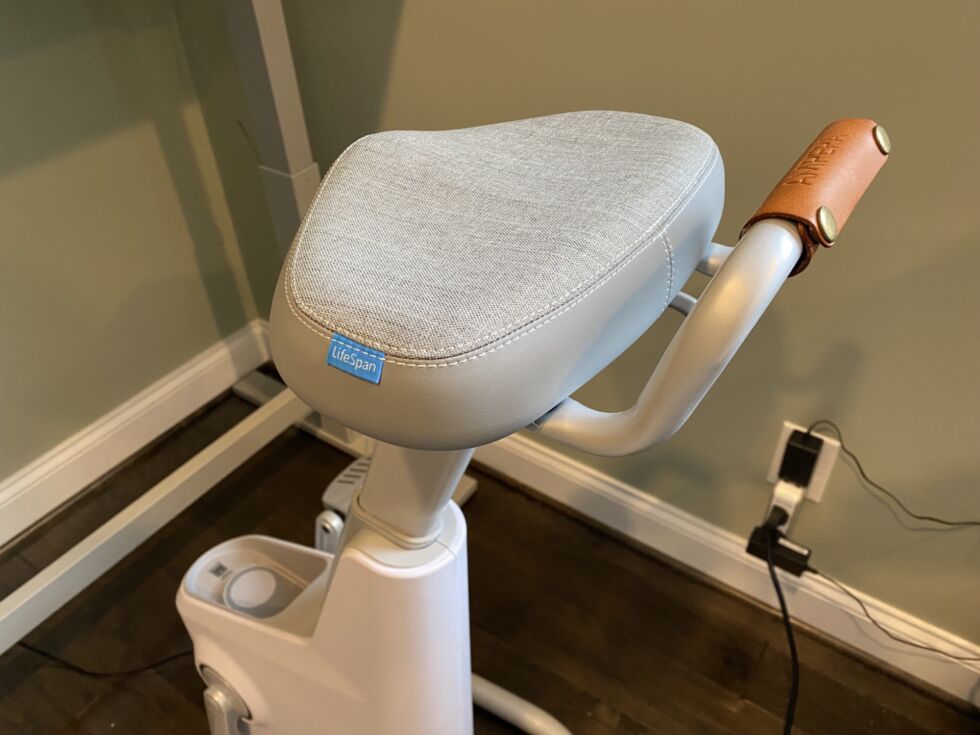
I enjoy getting my exercise, but hate doing it indoors. I’d much rather get some fresh air and watch the world drift past me as I cycle or hike somewhere than watch a screen while sweating away on something stationary.
To get a bit more of what I like, I’ve invested in a variety of gear that has extended my cycling season deeper into the winter. But even with that, there are various conditions—near-freezing temperatures, heavy rains, Canada catching fire—that have kept me off the roads. So, a backup exercise plan has always been on my to-do list.
The company LifeSpan offers exercise equipment that fits well into a home office and gave me the chance to try its Ampera model. It’s a stationary bike that tucks nicely under a standing desk and has a distinct twist: You can pedal to power the laptop you’re working on. Overall, the hardware is well-designed, but some glitches, software issues, and design decisions keep it from living up to its potential.
Solid hardware
Many aspects of the Ampera are pretty well designed. Its hefty weight keeps it stable even when someone my size (~90 kg/200 lbs) is pedaling away on it. If it starts tilting, there’s a metal ring around the base that should keep it from falling over, although I’ve been fortunate enough not to test this. Despite its size, it’s still easy to move around since it tilts forward onto some wheels and rolls around easily.
That tilting is best managed by using a handle that attaches to the underside of the seat. That’s more of a mixed bag, as it limits how far back on the seat you can sit. It should be possible to install it upside-down so the handle tilts under the seat if this is a problem, though. The height of the seat is easily adjustable. It telescopes out of the base on a metal pole; pull up on a lever under the seat, and it will slide up or down to wherever you find comfortable.
Even with my relatively long legs, I had no problem finding a comfortable setting. However, to keep working while pedaling, I needed to set a standing desk at its maximum height. This is not something that you can expect to use while sitting at a more traditional desk.
As for the seat itself, it’s wide and cushy, so quite unlike a typical bike saddle. There are a few things about this that I’m not convinced by. To start with, the padding will eventually wear down if it’s heavily used, and the use of a non-cycling attachment—it bolts onto a flat metal plate—means it’s going to be harder to replace. The fabric might also be a problem if, as I do, you tend to sweat a lot while exercising. (More expensive stationary bikes, like Pelotons, can fit standard bicycle seats.)

Enlarge / The seat of the Ampera isn’t typical cycling hardware, and incorporates a handled to move the base around.
John Timmer
The pedals are fine. The texture of the polymer mostly kept my feet where I wanted them. The occasional slip was likely because I’m unused to thinking about how to keep my feet in place—the product of using clipless pedals on both my road and mountain bikes.
The two other notable features of the hardware are a ring of colored LEDs around the cranks, a USB-C port at the front of the base, and a Qi wireless charging pad in the center of the pedestal. There aren’t any controls on the hardware; everything is controlled via software.
>>> Read full article>>>
Copyright for syndicated content belongs to the linked Source : Ars Technica – https://arstechnica.com/?p=2005793










